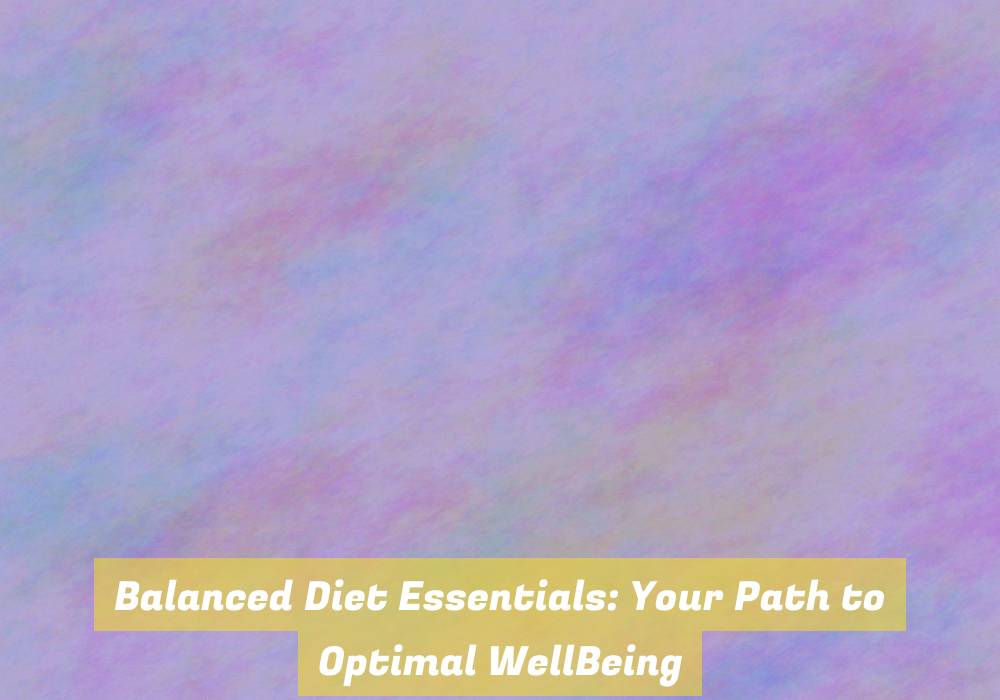Balanced Diet Essentials: Your Path to Optimal WellBeing
You know the importance of exercise for a healthy body and mind. But have you ever considered the impact of your diet on your overall well-being? ItG??s easy to overlook the role that nutrition plays in your daily life, but the truth is, a balanced diet is essential for optimal health.
What you consume directly affects your energy levels, mood, and even your ability to focus. So, how can you ensure that youG??re getting the right nutrients to support your well-being?
LetG??s explore the fundamental elements of a balanced diet and how they can pave the way for your path to optimal well-being.
Understanding Balanced Nutrition
To maintain a balanced diet, itG??s essential to understand the principles of balanced nutrition. Understanding balanced nutrition starts with recognizing the importance of consuming a variety of foods from all the food groups. This means incorporating plenty of fruits, vegetables, whole grains, lean proteins, and healthy fats into your meals. Each food group provides different essential nutrients that your body needs to function at its best.
Additionally, itG??s crucial to be mindful of portion sizes. Even nutritious foods can lead to weight gain if consumed in excessive amounts. Pay attention to recommended serving sizes and try not to overindulge, even with healthy options.
Another key aspect of balanced nutrition is staying hydrated. Water plays a critical role in various bodily functions, including digestion, nutrient absorption, and temperature regulation. Aim to drink an adequate amount of water throughout the day to support your overall health.
Furthermore, understanding the impact of added sugars, sodium, and unhealthy fats on your diet is essential. Limiting the intake of these components can contribute to a more balanced and nutritious eating plan.
Key Nutrients for Well-being
Understanding balanced nutrition, particularly the intake of key nutrients, is crucial for supporting your overall well-being and health. A balanced diet should include essential nutrients such as vitamins, minerals, protein, carbohydrates, healthy fats, and water. These nutrients play a vital role in maintaining your bodyG??s functions and promoting optimal well-being.
Vitamins and minerals are essential micronutrients that support various bodily functions, including immune system health, bone strength, and energy production. Incorporating a variety of colorful fruits and vegetables into your diet can help ensure that you receive a wide range of vitamins and minerals. Additionally, consuming sources of lean protein, such as poultry, fish, beans, and nuts, is important for muscle health and repair.
Carbohydrates are the bodyG??s primary source of energy, so itG??s important to include whole grains, fruits, and vegetables in your diet. Healthy fats, found in foods like avocados, nuts, and olive oil, are crucial for brain function and hormone production. Lastly, staying hydrated by drinking an adequate amount of water is essential for overall well-being.
Mindful Eating Practices
When practicing mindful eating, focus on being present and attentive to your meal. This means sitting down without distractions, such as electronic devices or television, and truly savoring each bite. Pay attention to the flavors, textures, and aromas of your food. Chew slowly and appreciate the nourishment your meal provides.
Mindful eating also involves recognizing your bodyG??s hunger and fullness cues. Before eating, assess your level of hunger, and while eating, pause occasionally to gauge your fullness. This practice helps prevent overeating and promotes better digestion.
Additionally, mindful eating encourages you to be aware of the emotions and triggers that may lead to unhealthy eating habits. By being conscious of these factors, you can make more informed choices about what and how much you eat.
Incorporating mindful eating practices into your daily routine can lead to a healthier relationship with food, a greater appreciation for meals, and improved overall well-being. So, take the time to eat mindfully and nourish both your body and mind.
Implementing Balanced Diet Habits
As you embrace mindful eating practices, incorporating balanced diet habits into your routine will ensure that you nourish your body effectively and maintain overall well-being. Start by prioritizing fresh, whole foods such as fruits, vegetables, lean proteins, and whole grains. These foods are rich in essential nutrients and are key components of a balanced diet.
Additionally, aim to limit your intake of processed foods, sugary snacks, and high-fat meals, as they can contribute to health issues when consumed in excess.
Another crucial aspect of implementing balanced diet habits is to stay hydrated by drinking an adequate amount of water throughout the day. Water plays a vital role in digestion, nutrient absorption, and overall bodily functions.
Furthermore, portion control is essential in maintaining a balanced diet. Be mindful of serving sizes to avoid overeating and to ensure that youG??re consuming the right amount of nutrients for your bodyG??s needs.
Incorporating balanced diet habits into your lifestyle may also involve meal planning and preparation. By taking the time to plan and prepare nutritious meals, you can avoid relying on convenient yet unhealthy food choices.
Lastly, aim for consistency rather than perfection. Making small, sustainable changes to your diet habits over time will lead to long-term success in achieving and maintaining optimal well-being.
Conclusion
In conclusion, achieving optimal well-being through a balanced diet is within your reach. By understanding the importance of key nutrients, practicing mindful eating, and implementing healthy habits, you can pave the way to a healthier and happier life.
Remember, itG??s all about making small, sustainable changes that add up to big results. So, take charge of your nutrition and watch as your overall well-being flourishes.
YouG??ve got this!





